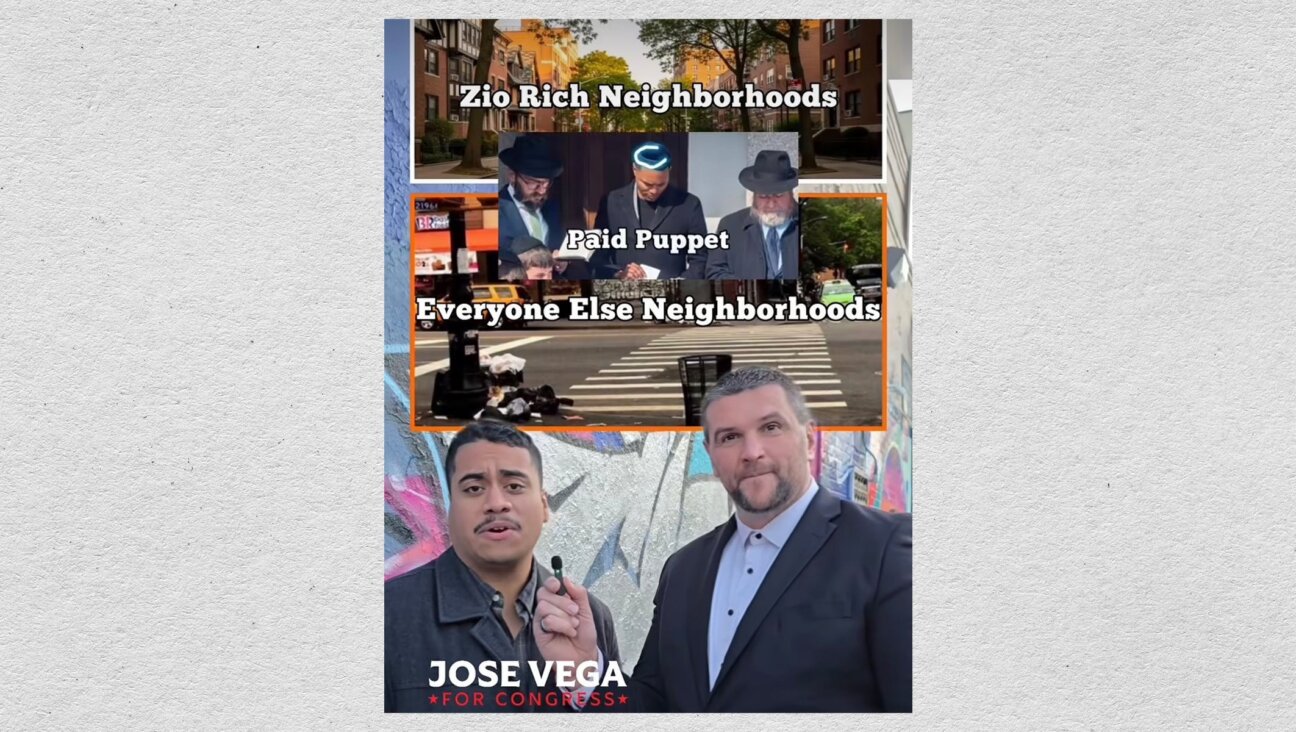The song in an ad for an Israeli cafe has become a nationwide party anthem
Many of the catchy tune’s fans don’t know that it’s an adaptation of a Greek song

Performers dance in the video for the song “Omelette Bread in Netanya.” (Screenshot from YouTube)
JAFFA, Israel (JTA) — The Hebrew lyrics for an Israeli sandwich shop ad don’t sound quite like a typical Israeli night club anthem.
“Kebab, merguez sausage, shakshuka/Vegetables and onion are always interesting…Now that you’ve eaten a baguette with soul/you will definitely be back,” the song goes.
But “Omelette Bread in Netanya,” the song in an ad for a shop of the same name in the coastal city, has gone viral in Israel, racking up millions of views on TikTok and spawning hundreds of spin-offs, parodies, and restaurant review videos. It is being played at trance parties, weddings and in the heads of millions of unassuming social media scrollers.
“Omelette bread” is a direct translation, but it refers to an omelette sandwich, which is popular in Israel.
The kiosk’s owner, Vicky Ezra — the man who, if the song is to be believed, “puts his love into the baguette” — wasn’t always a sandwich connoisseur. Before falling sick with COVID-19 during Israel’s first wave in March 2020, Ezra was a successful real estate businessman. Ezra was put into an induced coma and only regained consciousness two and a half weeks later. He told Israel’s Channel 12 that he was sure he was going to die.
During his lengthy rehabilitation, he was haunted by nightmares and decided he couldn’t return to his former business. He bought the modest-sized shop as an inheritance for his son, Moriel.
The song was made not so much as a marketing ploy, but more to make Ezra happy, the Channel 12 report said, citing his family’s musical background.
In a clip shared on Omelette Bread’s TikTok account — which was opened as a result of the song and has since garnered more than half a million likes — the singer, Avi Levy, says the tune was written in 10 minutes. The clip ends with Levy quipping that he hopes the song’s popularity will draw enough fans to fill Caesarea Amphitheatre, one of Israel’s largest performance venues.
What Levy doesn’t mention is that “Omelette Bread in Netanya” is actually a cover of a Greek song, “To Diamerisma,” by folk legend Vasilis Karras.
Levy is not alone in adapting songs from Greek artists.That process has been a phenomenon in Israeli music for at least the past 60 years, according to Yasmin Ishbi, the chief music editor for Galgalatz, Israel’s most-listened to music station.
“Many of the hits from the 1970s, 80s and 90s were actually Greek songs that went through giyur,” Ishbi told the Jewish Telegraphic Agency, referring to the Jewish conversion process. She cited music icons Arik Einstein and Yehuda Poliker among hundreds of Israeli musicians who remade Greek songs.
The Greek Jewish community is relatively small, as so many Greek Jews had been wiped out during the Holocaust — so the impact of Greek music on Israeli music, especially for Mizrahi Israelis, Ishbi said, is vastly outsized. Greek songs “filled the void” of culture in the country’s early days, before Israel cultivated its own music style.
“It was lighter than the music coming out of Arab countries, and because it had one foot in the West and one foot in East, it acted like a bridge connecting Ashkenazi and Mizrahi immigrants,” Ishbi said. “Many [Mizrahi Jews] were embarrassed by the music they traditionally listened to, like Umm Kulthum and Farid al-Atrash.”
It makes “total sense” that “Omelet Bread in Netanya” was inspired by a Greek song, Ishbi said, because the “melody is just so good.”
“The charming thing about it is that it was done with zero intention to become viral,” she said. “So when you watch it, you laugh at them and their absurd lyrics, but you’re also laughing with them.”
This article originally appeared on JTA.org.














